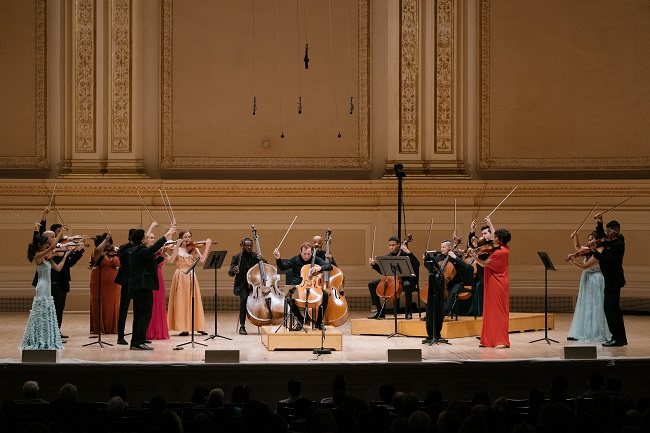 United States Sphinx Virtuosi Gala: Amaryn Olmeda, Hannah White (violins), Tommy Mesa (cello), Xavier Foley (bass), Sphinx Virtuosi / Alex Gonzalez (concertmaster/conductor). Carnegie Hall, New York, 13.10.2022. (DS)
United States Sphinx Virtuosi Gala: Amaryn Olmeda, Hannah White (violins), Tommy Mesa (cello), Xavier Foley (bass), Sphinx Virtuosi / Alex Gonzalez (concertmaster/conductor). Carnegie Hall, New York, 13.10.2022. (DS)

Villa-Lobos – ‘Bachianas brasileiras’ No.9
Valerie Coleman – ‘Tracing Visions’ (New York premiere)
Carlos Simon – ‘Between Worlds’
Jessie Montgomery – ‘Divided’ (New York premiere)
Xavier Foley – ‘An Ode to Our Times’ (world premiere)
Beethoven (arr. by Ruben Rengel for string orchestra) – Finale from Sonata for Violin and Piano No.9 in A major Op.47
At the twenty-fifth-anniversary Sphinx gala concert this past week in Carnegie Hall, we learned what an organization like Sphinx Virtuosi can do to diversify the face of classical music. The Detroit-based ensemble is comprised of 18 musicians and includes Latinx and Black musicians from across the Americas. Not only was the concert hall packed – a rarity these days for many large New York City concert halls delivering classical fare – but it provided the opportunity to hear some of the best works by inspiring composers performed by engaging soloists.
The evening began with an ebullient and lyrically sweet performance of ‘Bachianas brasileiras’ No.9 by Villa-Lobos. The ensemble set the tone for the concert with their confident, robust sound, one that would sustain itself throughout the evening. Led vigorously by the tireless Alex Gonzalez, they established the enthusiastic and technically brilliant flare with which they would approach all the works.
The heart of the concert lay in four new compositions, all of which touched upon the themes of resilience, community, history and progress. Valerie Coleman’s ‘Tracing Visions’ is a heart-wrenching piece dedicated to the shooting at Uvalde. To her credit, this is a bold work of remembrance and grief, as well as a testament to the importance and dignity of children.
The densely packed, three-minute ‘Between Worlds’ by Carlos Simon was performed by Amaryn Olmeda on violin. Olmeda’s extraordinary power and strength shouldered a hearty expressiveness, her technique beautifully capturing the full range of violin tones with a soothing, brave sound. Her style brilliantly matched Simon’s work which portrays Bill Taylor, who was born enslaved and died after World War II. The work ends with a resounding one-note pizzicato, like the punctuation closing a memorable sonnet.
Solo cellist Tommy Mesa performed Jessie Montgomery’s ‘Divided’ with the ensemble. The two were so connected that the solo voice of the cello and the choral-like responses of the ensemble matched fluidly, like an improvised conversation. The topic that Montgomery tackles – today’s social and political unrest – requires fervor of composition and fearlessness in playing, and both were served by composer and performers. The cello solo also revealed hints of Shostakovich, while Mesa’s style provided an emotionally empathetic sound with muscular fortitude.
Finally, Xavier Foley came on stage with his bass, dressed all in black with a white bow tie. ‘An Ode to Our Times’ – his work for violin and bass – had an enrapturing, percolating mood. Joined by Hannah White on violin, Foley brings these two instruments of opposite register as close together, sonorously, as possible: White played often on the lower violin strings and Foley attacked the higher bass registers with nimble fingers. The two players passed catchy motifs back and forth with a jazz-like flare without abandoning a classical style. In these turbulent times, perhaps music can demonstrate how polar opposites can find their nearest meeting points and create something electrifying.
The gala ended with brief speeches, including a poem by founder Aaron Dworkin. The Sphinx Ensemble left the audience (whose supportive applause never waned) with the Finale movement of Beethoven’s Sonata for Violin and Piano No.9, arranged for string orchestra by Ruben Rengel. This was no odd choice but rather a revisiting of the work’s original 1803 dedication to the virtuoso violinist of African descent, George Polgreen Bridgetower. It’s true that we know it as the Kreutzer Sonata: Beethoven quarreled with Bridgetower and changed the dedication. But thanks to Sphinx Virtuosi, his name emerges again. And today’s virtuosi of Black and Latinx heritage should not have the same erased history as did Mr. Bridgetower.
Daniele Sahr
